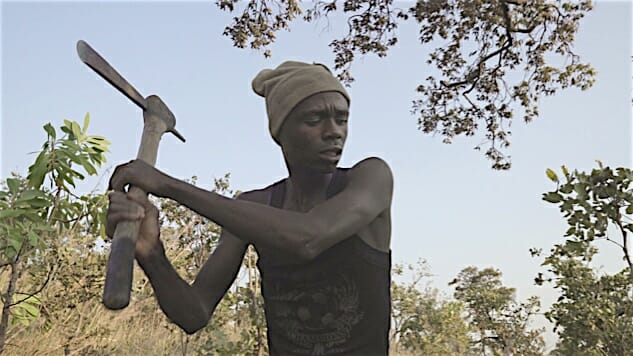Makala

Our work defines us. Perhaps more than any other thing we do in life, our labor becomes a way that we express who we are to the world around us—not just our profession, but our attitude toward it, and the ways in which we approach the tasks at hand. For those of us who work to make a living, we’re connected to our jobs in an intimate way—we need them, and perhaps they also give us some measure of satisfaction or self-worth. Our work is our second skin—and maybe the thing that we’ll be best known for once we’re gone.
The immersive documentary Makala brings these thoughts to the fore. French director Emmanuel Gras, who won the top prize at last year’s Cannes Critics Week, invites us to spend a few days with Kabwita, a 28-year-old Congolese man who sets about selling his charcoal at a nearby market. Kabwita has a family to support—he has a child who needs medicine—and Gras stays out of his way, simply observing him as he goes about his job. Makala is a movie about process, but it’s also about the work we do and the ways we spend time on this planet. The documentary’s so simple it feels profound without ever really trying.
As we’ll quickly learn, selling charcoal is harder than it sounds. For starters, you have to acquire the raw materials to create charcoal. Gras’ camera trails behind Kabwita as he silently walks toward a massive tree, a pickaxe on his shoulder. We’re not given any information about where exactly Kabwita lives—the press notes indicate it’s nearby Kolwezi, “a fairly dry region, with vast open-pit mines”—but we can sense the harshness of the environment. And then, Kabwita begins chopping down the tree. Early on, Makala establishes its rhythm, asking us to consider the effort that manual labor requires by lingering on it. Gras gives us shots of Kabwita working on that towering object until, eventually, it falls over, the camera taking in the magnificence and shock of that moment.
As the documentary proceeds, there is no voiceover, no interviews and no title cards explaining what we’re watching. Makala instead wants us to embrace the sparseness of Kabwita’s life—and the nonchalance of how he goes about his tasks. He’ll turn the tree into charcoal using an oversized earthen oven—this also takes time—and then he’s off, tying the heavy, cumbersome bags of charcoal to his bike so he can push them into town, which appears to be quite a distance away. Kabwita never looks into the camera—he barely seems to even acknowledge Gras’ presence. He’s got work to do.
Such a description of Makala risks reducing the film to a precious paean to salt-of-the-earth types, romanticizing daily labor and patronizingly turning Kabwita into a martyr or saint. What’s remarkable about the film is that Gras resists these temptations and attitudes. Makala is gorgeously shot—the low-light photography is especially striking—but it possesses a purity that sidesteps accusations of “poverty porn.” Gras is empathetic, but he’s also reserved, respectful, just a bit distant. The director focuses on showing what Kabwita’s life requires, and by not engaging his subject, Gras allows him to just be himself, whether we’re watching or not.